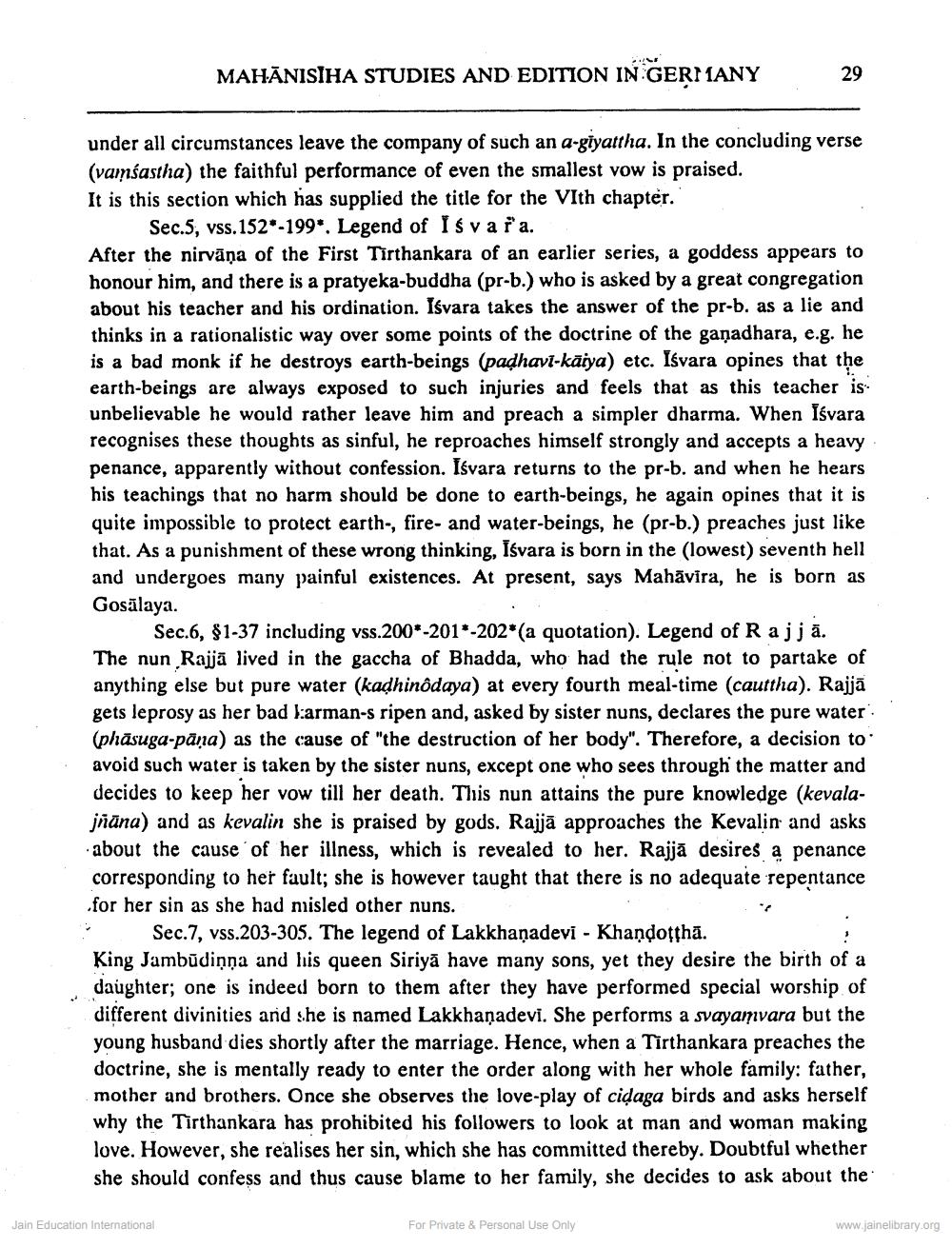________________
MAHĀNISIHA STUDIES AND EDITION IN GERTIANY
29
under all circumstances leave the company of such an a-giyattha. In the concluding verse (vamśastha) the faithful performance of even the smallest vow is praised. It is this section which has supplied the title for the VIth chapter.'
Sec.5, vss. 152*-199*. Legend of Isvara. After the nirvāņa of the First Tirthankara of an earlier series, a goddess appears to honour him, and there is a pratyeka-buddha (pr-b.) who is asked by a great congregation about his teacher and his ordination. Isvara takes the answer of the prob. as a lie and thinks in a rationalistic way over some points of the doctrine of the ganadhara, e.g. he is a bad monk if he destroys earth-beings (padhavi-kāiya) etc. Isvara opines that the earth-beings are always exposed to such injuries and feels that as this teacher is: unbelievable he would rather leave him and preach a simpler dharma. When Isvara recognises these thoughts as sinful, he reproaches himself strongly and accepts a heavy penance, apparently without confession. Iśvara returns to the prob. and when he hears his teachings that no harm should be done to earth-beings, he again opines that it is quite impossible to protect earth-, fire- and water-beings, he (pr-b.) preaches just like that. As a punishment of these wrong thinking, īśvara is born in the lowest) seventh hell and undergoes many painful existences. At present, says Mahāvira, he is born as Gosālaya.
Sec.6, 81-37 including vss.200*-201*-202*(a quotation). Legend of Rajj ā. The nun Rajjā lived in the gaccha of Bhadda, who had the rule not to partake of anything else but pure water (kadhinôdaya) at every fourth meal-time (cauttha). Raijā gets leprosy as her bad larman-s ripen and, asked by sister nuns, declares the pure water (phāsuga-pāna) as the cause of "the destruction of her body". Therefore, a decision to avoid such water is taken by the sister nuns, except one who sees through the matter and decides to keep her vow till her death. This nun attains the pure knowledge (kevalajñāna) and as kevalin she is praised by gods. Raijā approaches the Kevalin and asks about the cause of her illness, which is revealed to her. Rajjā desires a penance corresponding to her fault; she is however taught that there is no adequate repentance .for her sin as she had nisled other nuns. - Sec.7, vss.203-305. The legend of Lakkhaṇadevi - Khandoshā. King Jambūdiņna and his queen Siriyā have many sons, yet they desire the birth of a daughter; one is indeed born to them after they have performed special worship of different divinities and she is named Lakkhamadevi. She performs a svayamvara but the young husband dies shortly after the marriage. Hence, when a Tirthankara preaches the doctrine, she is mentally ready to enter the order along with her whole family: father, mother and brothers. Once she observes the love-play of cidaga birds and asks herself why the Tirthankara has prohibited his followers to look at man and woman making love. However, she realises her sin, which she has committed thereby. Doubtful whether she should confess and thus cause blame to her family, she decides to ask about the
Jain Education International
For Private & Personal Use Only
www.jainelibrary.org




